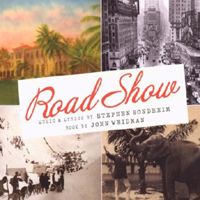 Original Off-Broadway Cast, 2009 (Nonesuch/PS Classics)
Original Off-Broadway Cast, 2009 (Nonesuch/PS Classics)  (1 / 5) What started off as a coruscating musical-comedy cavalcade ended dour and dumpy with the 2008 premiere of Road Show, the final (?) incarnation of Stephen Sondheim and John Weidman’s Mizner Brothers biomusical. As spearheaded (and speared) by director John Doyle, this is American history pageantry scalped of the fun, joy, and — well, the bounce that characterized the work’s three earlier incarnations. (See separate review of the recording of one of those versions, Bounce.) Wilson and Addison are played here by Michael Cerveris and Alexander Gemignani with maximum sense of occasion and minimal charisma, weighing down even the better numbers — such as the romantic “The Best Thing That Has Ever Happened” and the ostensibly scheming “The Game” — to the point where they can’t rise above the muck. Morose, muddy orchestrations by Jonathan Tunick and indifferent musical direction by Mary-Mitchell Campbell don’t inject any much-needed energy. Among the supporting cast, which also includes Claybourne Elder as Addison’s lover and William Parry as the boys’ father, only Alma Cuervo as Mama Mizner suggests in her aching solo “Isn’t He Something!” the combination of wit and heart that should drive this story. The rest of the recording, like the show at this point, is, as the opening number puts it, a waste. — Matthew Murray
(1 / 5) What started off as a coruscating musical-comedy cavalcade ended dour and dumpy with the 2008 premiere of Road Show, the final (?) incarnation of Stephen Sondheim and John Weidman’s Mizner Brothers biomusical. As spearheaded (and speared) by director John Doyle, this is American history pageantry scalped of the fun, joy, and — well, the bounce that characterized the work’s three earlier incarnations. (See separate review of the recording of one of those versions, Bounce.) Wilson and Addison are played here by Michael Cerveris and Alexander Gemignani with maximum sense of occasion and minimal charisma, weighing down even the better numbers — such as the romantic “The Best Thing That Has Ever Happened” and the ostensibly scheming “The Game” — to the point where they can’t rise above the muck. Morose, muddy orchestrations by Jonathan Tunick and indifferent musical direction by Mary-Mitchell Campbell don’t inject any much-needed energy. Among the supporting cast, which also includes Claybourne Elder as Addison’s lover and William Parry as the boys’ father, only Alma Cuervo as Mama Mizner suggests in her aching solo “Isn’t He Something!” the combination of wit and heart that should drive this story. The rest of the recording, like the show at this point, is, as the opening number puts it, a waste. — Matthew Murray
Category Archives: Q-S
Silk Stockings
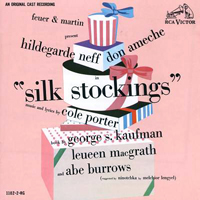 Original Broadway Cast, 1955 (RCA)
Original Broadway Cast, 1955 (RCA)  (4 / 5) Cole Porter’s last Broadway show is a charming and sophisticated musical based on the Greta Garbo film Ninotcka. Only Porter could have given that heady cinematic masterpiece the urbane and romantic musical touch that it deserved. Set against an enticing Parisian background that inspired one of the great composer-lyricist’s most sensual love songs, “All of You,” Silk Stockings has a score that also includes the melodic and witty “Paris Loves Lovers,” the smoldering title song, the comedic “Stereophonic Sound” and “It’s a Chemical Reaction, That’s All,” the swinging “Satin and Silk,” and the jazzy “Red Blues.” A strong cast is headed by Hildegarde Neff as Ninotchka, a dour Russian official visiting Paris, and Don Ameche as a slick American talent agent. Gretchen Wyler is a particular delight in a supporting role, displaying plenty of spunk when belting out hilarious Porter lyrics in “Stereophonic Sound.” (Sample: “If Zanuck’s latest picture were the good, old fashioned kind / There’d be no one in front to look at Marilyn’s behind…”) This recording has lots of sensational lyrics that were considered too risqué for the film version of Silk Stockings, yet it’s not perfect; the production numbers sound a bit frenetic, and even the overture is rushed. — Gerard Alessandrini
(4 / 5) Cole Porter’s last Broadway show is a charming and sophisticated musical based on the Greta Garbo film Ninotcka. Only Porter could have given that heady cinematic masterpiece the urbane and romantic musical touch that it deserved. Set against an enticing Parisian background that inspired one of the great composer-lyricist’s most sensual love songs, “All of You,” Silk Stockings has a score that also includes the melodic and witty “Paris Loves Lovers,” the smoldering title song, the comedic “Stereophonic Sound” and “It’s a Chemical Reaction, That’s All,” the swinging “Satin and Silk,” and the jazzy “Red Blues.” A strong cast is headed by Hildegarde Neff as Ninotchka, a dour Russian official visiting Paris, and Don Ameche as a slick American talent agent. Gretchen Wyler is a particular delight in a supporting role, displaying plenty of spunk when belting out hilarious Porter lyrics in “Stereophonic Sound.” (Sample: “If Zanuck’s latest picture were the good, old fashioned kind / There’d be no one in front to look at Marilyn’s behind…”) This recording has lots of sensational lyrics that were considered too risqué for the film version of Silk Stockings, yet it’s not perfect; the production numbers sound a bit frenetic, and even the overture is rushed. — Gerard Alessandrini
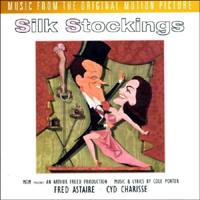 Film Soundtrack, 1957 (MGM/Rhino-Turner)
Film Soundtrack, 1957 (MGM/Rhino-Turner)  (4 / 5) The treatment of Porter’s score by André Previn and the MGM orchestra is flawless, with musical arrangements and orchestrations far more dazzling than the Broadway originals. Fred Astaire was perfectly cast in Silk Stockings as the male lead, but Cyd Charisse was less well suited to the role of Ninotchka — a moot point when it comes to the soundtrack album, since Charisse’s singing was dubbed by Carol Richards. Janis Paige, Jules Munshin, and Peter Lorre (!) in his only musical are all great fun. Although the movie itself isn’t considered a top MGM musical, the soundtrack is definitely a winner. Previn’s conducting of “The Red Blues” and “Stereophonic Sound” is exciting, the lush orchestrations for Astaire’s vocal and dance in “All of You” are gorgeous, and added to the score are two songs that were written by Porter especially for Astaire; one of them, “Fated to Be Mated,” is a real treat. The only disappointment of this recording is the ridiculous censoring of some lyrics that were considered too explicit for movie audiences of the day. How amazing that an American film released in 1957 couldn’t contain the lines, “If Ava Gardner played Godiva riding on a mare / The people wouldn’t pay a cent to see her in the bare…” — G.A.
(4 / 5) The treatment of Porter’s score by André Previn and the MGM orchestra is flawless, with musical arrangements and orchestrations far more dazzling than the Broadway originals. Fred Astaire was perfectly cast in Silk Stockings as the male lead, but Cyd Charisse was less well suited to the role of Ninotchka — a moot point when it comes to the soundtrack album, since Charisse’s singing was dubbed by Carol Richards. Janis Paige, Jules Munshin, and Peter Lorre (!) in his only musical are all great fun. Although the movie itself isn’t considered a top MGM musical, the soundtrack is definitely a winner. Previn’s conducting of “The Red Blues” and “Stereophonic Sound” is exciting, the lush orchestrations for Astaire’s vocal and dance in “All of You” are gorgeous, and added to the score are two songs that were written by Porter especially for Astaire; one of them, “Fated to Be Mated,” is a real treat. The only disappointment of this recording is the ridiculous censoring of some lyrics that were considered too explicit for movie audiences of the day. How amazing that an American film released in 1957 couldn’t contain the lines, “If Ava Gardner played Godiva riding on a mare / The people wouldn’t pay a cent to see her in the bare…” — G.A.
Side Show
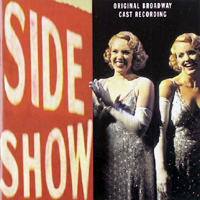 Original Broadway Cast, 1997 (Sony)
Original Broadway Cast, 1997 (Sony)  (2 / 5) Based on the lives of Daisy and Violet Hilton, twins who were born joined at the hip and who had minor show business careers that exploited their oddity, Side Show was one of the most overwrought musicals of its era. On Broadway, the exciting staging by Robert Longbottom distracted from all the heavy emoting; here, you have to deal head-on with the exhausting score by Henry Krieger (music) and Bill Russell (lyrics). The book, by Russell, follows the sisters as they fall in love with a pair of promoters, achieve mainstream celebrity, then realize that they will never find happiness in marriage. It’s a touching story undermined by hysterical dramatics and weepy ballads that harp on the loneliness of carnival freaks. Krieger’s score is melodic, but every number is pitched at finale level, and Russell’s lyrics consistently skirt the ridiculous. The acid test is the number “Tunnel of Love,” in which the twins take a spin on the anonymous amusement park ride along with their boyfriends, hopeful of having sex in the dark. Alice Ripley and Emily Skinner are excellent as Violet and Daisy, screaming their heads off as the score demands. Jeff McCarthy and Hugh Panaro are okay as their men, Norm Lewis offers powerful vocals as a factotum who loves Violet, and Ken Jennings strikes sinister notes as the creepy sideshow boss. — David Barbour
(2 / 5) Based on the lives of Daisy and Violet Hilton, twins who were born joined at the hip and who had minor show business careers that exploited their oddity, Side Show was one of the most overwrought musicals of its era. On Broadway, the exciting staging by Robert Longbottom distracted from all the heavy emoting; here, you have to deal head-on with the exhausting score by Henry Krieger (music) and Bill Russell (lyrics). The book, by Russell, follows the sisters as they fall in love with a pair of promoters, achieve mainstream celebrity, then realize that they will never find happiness in marriage. It’s a touching story undermined by hysterical dramatics and weepy ballads that harp on the loneliness of carnival freaks. Krieger’s score is melodic, but every number is pitched at finale level, and Russell’s lyrics consistently skirt the ridiculous. The acid test is the number “Tunnel of Love,” in which the twins take a spin on the anonymous amusement park ride along with their boyfriends, hopeful of having sex in the dark. Alice Ripley and Emily Skinner are excellent as Violet and Daisy, screaming their heads off as the score demands. Jeff McCarthy and Hugh Panaro are okay as their men, Norm Lewis offers powerful vocals as a factotum who loves Violet, and Ken Jennings strikes sinister notes as the creepy sideshow boss. — David Barbour
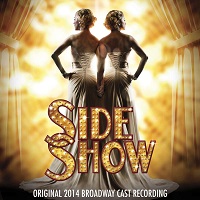 Broadway Cast, 2014 (Broadway Records)
Broadway Cast, 2014 (Broadway Records)  (2 / 5) This revisal of Side Show offered a substantial revision of the score, with frequently superb music by Henry Krieger and frequently awkward lyrics by Bill Russell. Despite the all-around sharp performances, the revisions largely take this daring, troubled show in the wrong direction. While the original version and its cast album embrace just enough over-the-top poperetta campiness to make the premise palatable, the revisal’s grim seriousness leaves much of the new material sounding silly rather than self-aware. This is most painfully rendered in an extended flashback sequence during which doctors attempt to sever the sisters from each other and Houdini teaches them mindfulness. As Daisy and Violet, Emily Padgett and Erin Davie are worthy successors to Emily Skinner and Alice Ripley with an even eerier vocal blend when they sing in unison, although they smooth out the ’90s pop edges that the original pair brought to these songs. David St. Louis sings with compelling warmth as Jake, but Ryan Silverman doesn’t quite match the tortured baritenor climaxes of Jeff McCarthy’s original performance as the slick Terry. Harold Wheeler’s sublime orchestrations — the original cast album’s strongest suit — sound more muted here in somewhat reduced form, and the replacement of three bad-taste vaudeville pastiche numbers with three interchangeable numbers feels like cosmetic surgery on a show whose central problem is bone-deep. — Dan Rubins
(2 / 5) This revisal of Side Show offered a substantial revision of the score, with frequently superb music by Henry Krieger and frequently awkward lyrics by Bill Russell. Despite the all-around sharp performances, the revisions largely take this daring, troubled show in the wrong direction. While the original version and its cast album embrace just enough over-the-top poperetta campiness to make the premise palatable, the revisal’s grim seriousness leaves much of the new material sounding silly rather than self-aware. This is most painfully rendered in an extended flashback sequence during which doctors attempt to sever the sisters from each other and Houdini teaches them mindfulness. As Daisy and Violet, Emily Padgett and Erin Davie are worthy successors to Emily Skinner and Alice Ripley with an even eerier vocal blend when they sing in unison, although they smooth out the ’90s pop edges that the original pair brought to these songs. David St. Louis sings with compelling warmth as Jake, but Ryan Silverman doesn’t quite match the tortured baritenor climaxes of Jeff McCarthy’s original performance as the slick Terry. Harold Wheeler’s sublime orchestrations — the original cast album’s strongest suit — sound more muted here in somewhat reduced form, and the replacement of three bad-taste vaudeville pastiche numbers with three interchangeable numbers feels like cosmetic surgery on a show whose central problem is bone-deep. — Dan RubinsSide by Side by Sondheim
 Original London/Broadway Cast, 1976 (RCA)
Original London/Broadway Cast, 1976 (RCA)  (2 / 5) When Side by Side by Sondheim opened in London, it was warmly received, as half of Sondheim’s shows had not yet been seen in the West End. In New York, where the material was much more familiar, the show still had a healthy Broadway run with the transplanted London company. The cast album reminds us how very fine these songs are; each included number from Sondheim’s pre-1977 shows, from West Side Story (music by Leonard Bernstein) to Pacific Overtures, is an extraordinary piece of work. Yet, with all of the Sondheim cast albums available, there’s little reason to revisit this one. Why, for instance, opt to hear Julia McKenzie and two pianists perform “Losing My Mind” when we can hear Dorothy Collins and the gorgeous Jonathan Tunick orchestrations on the original Broadway cast recording? Millicent Martin has her moments here, particularly in “I Never Do Anything Twice” from the film The Seven-Per-Cent Solution, but her renditions of other songs simply can’t compare with recordings of the original performances. David Kernan, who conceived the show, is the third and least interesting member of the cast. — David Wolf
(2 / 5) When Side by Side by Sondheim opened in London, it was warmly received, as half of Sondheim’s shows had not yet been seen in the West End. In New York, where the material was much more familiar, the show still had a healthy Broadway run with the transplanted London company. The cast album reminds us how very fine these songs are; each included number from Sondheim’s pre-1977 shows, from West Side Story (music by Leonard Bernstein) to Pacific Overtures, is an extraordinary piece of work. Yet, with all of the Sondheim cast albums available, there’s little reason to revisit this one. Why, for instance, opt to hear Julia McKenzie and two pianists perform “Losing My Mind” when we can hear Dorothy Collins and the gorgeous Jonathan Tunick orchestrations on the original Broadway cast recording? Millicent Martin has her moments here, particularly in “I Never Do Anything Twice” from the film The Seven-Per-Cent Solution, but her renditions of other songs simply can’t compare with recordings of the original performances. David Kernan, who conceived the show, is the third and least interesting member of the cast. — David Wolf
Show Girl
 Original Broadway Cast, 1961 (Roulette/no CD)
Original Broadway Cast, 1961 (Roulette/no CD)  (3 / 5) Carol Channing spent many years between Gentlemen Prefer Blondes and Hello, Dolly! touring in a successful nightclub act that was gussied up for Broadway as Show Girl. Critics and audiences were cool to having a legit stage used for what they saw as an illegit show — little did they know what was to come! — so it didn’t stay around long, but the album is charming. The music, lyrics, and sketches by Charles Gaynor draw some material from the star’s breakthrough 1948 Broadway show Lend an Ear, created by Gaynor. Channing was joined onstage in Show Girl by comedian Jules Munshin, but their sketches didn’t make it to the recording; Munshin is only heard sharing two sly songs, “My Kind of Love” with Channing and “The Girl Who Lived in Montparnasse” with Les Quat’ Jeudis, a French quartet. The rest is all Channing, and she’s wonderful, whether singing the faux Rodgers and Hammerstein number “This Is a Darn Fine Funeral” or enacting the tragic tale of silent film star Cecilia Sisson, whose career was doomed by a hilarious speech defect when the talkies arrived. Channing fans should be aware that Show Girl also exists on video, having been taped for TV way back when. — David Wolf
(3 / 5) Carol Channing spent many years between Gentlemen Prefer Blondes and Hello, Dolly! touring in a successful nightclub act that was gussied up for Broadway as Show Girl. Critics and audiences were cool to having a legit stage used for what they saw as an illegit show — little did they know what was to come! — so it didn’t stay around long, but the album is charming. The music, lyrics, and sketches by Charles Gaynor draw some material from the star’s breakthrough 1948 Broadway show Lend an Ear, created by Gaynor. Channing was joined onstage in Show Girl by comedian Jules Munshin, but their sketches didn’t make it to the recording; Munshin is only heard sharing two sly songs, “My Kind of Love” with Channing and “The Girl Who Lived in Montparnasse” with Les Quat’ Jeudis, a French quartet. The rest is all Channing, and she’s wonderful, whether singing the faux Rodgers and Hammerstein number “This Is a Darn Fine Funeral” or enacting the tragic tale of silent film star Cecilia Sisson, whose career was doomed by a hilarious speech defect when the talkies arrived. Channing fans should be aware that Show Girl also exists on video, having been taped for TV way back when. — David Wolf
Simply Heavenly
 Original Broadway Cast, 1958 (Columbia/Masterworks Broadway)
Original Broadway Cast, 1958 (Columbia/Masterworks Broadway)  (3 / 5) Strong reviews kept Simply Heavenly on the boards for about four months in all. The show opened Off-Broadway, later moved to Broadway for a while, then went back to Off-Broadway in a different venue and finished its run there. Sometime in the middle of all that, this album was recorded. The show was also telecast by WNET-Channel 13 for five consecutive evenings in 1959 as part of the station’s “Play of the Week” series. Langston Hughes fashioned the book and lyrics from “Simple Takes a Wife” and other stories he wrote about the life of the character Jess Simple in Harlem of the 1950s. The evocative music is by David Martin, and the jazzy arrangements make good use of electric guitars and throbbing trumpets. Melvin Stewart, who plays Simple, is not the greatest singer, but he’s effective in his three monologues included on the recording. Vocal honors go to Claudia McNeil, who sashays through her 11-o’clock number, “I’m a Good Old Girl,” with humor and style. Partnered by John Bouie, McNeil also rips into “Did You Ever Hear the Blues?” and “When I’m in a Quiet Mood.” Other pleasures include the sweet title song, sung by Marilyn Berry; “Let Me Take You for a Ride,” an amusing duet for Simple and Anna English; and Brownie McGhee’s artful interpretation of “Broken Strings.” — Jeffrey Dunn
(3 / 5) Strong reviews kept Simply Heavenly on the boards for about four months in all. The show opened Off-Broadway, later moved to Broadway for a while, then went back to Off-Broadway in a different venue and finished its run there. Sometime in the middle of all that, this album was recorded. The show was also telecast by WNET-Channel 13 for five consecutive evenings in 1959 as part of the station’s “Play of the Week” series. Langston Hughes fashioned the book and lyrics from “Simple Takes a Wife” and other stories he wrote about the life of the character Jess Simple in Harlem of the 1950s. The evocative music is by David Martin, and the jazzy arrangements make good use of electric guitars and throbbing trumpets. Melvin Stewart, who plays Simple, is not the greatest singer, but he’s effective in his three monologues included on the recording. Vocal honors go to Claudia McNeil, who sashays through her 11-o’clock number, “I’m a Good Old Girl,” with humor and style. Partnered by John Bouie, McNeil also rips into “Did You Ever Hear the Blues?” and “When I’m in a Quiet Mood.” Other pleasures include the sweet title song, sung by Marilyn Berry; “Let Me Take You for a Ride,” an amusing duet for Simple and Anna English; and Brownie McGhee’s artful interpretation of “Broken Strings.” — Jeffrey Dunn
Swingtime Canteen
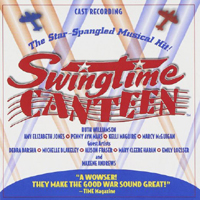 Studio Cast, 1997 (Performing Arts Preservation Assn.)
Studio Cast, 1997 (Performing Arts Preservation Assn.)  (3 / 5) When producer William Repicci caught a performance of a work in progress by Linda Thorsen Bond that was being staged in Midland, Texas, he was so impressed with the material that he recruited playwright Charles Busch to collaborate with him and Bond in refining the embryonic show. The result of their efforts is an all-female musical comedy set in London during World War II as a company of American singers, headed by an aging movie star, embarks on a U.S.O. tour of the battlefront. The Off-Broadway production of Swingtime Canteen, featuring Alison Fraser and Emily Loesser, had a nine-month run that included replacement stints by Busch — in drag, of course — playing the movie star, and a surviving Andrews sister, Maxene, playing herself. This recording features original cast members plus others — Ruth Williamson, Amy Elizabeth Jones, Penny Ayn Maas, and Kelli Maguire — from subsequent regional productions of the show. The voice of Maxene Andrews opens the recording and sets the scene. Others billed as “guest artists” include Mary Cleere Haran, who blends classic and contemporary styles in “I’m Old Fashioned” (Jerome Kern-Johnny Mercer); and Alison Fraser, who delivers “A Nightingale Sang in Berkeley Square” (Eric Maschwitz-Manning Sherwin) with exquisite simplicity. The album reaches its apex when Emily Loesser caresses “How High the Moon” (Morgan Lewis-Nancy Hamilton) with bluesy inflections. — Charles Wright
(3 / 5) When producer William Repicci caught a performance of a work in progress by Linda Thorsen Bond that was being staged in Midland, Texas, he was so impressed with the material that he recruited playwright Charles Busch to collaborate with him and Bond in refining the embryonic show. The result of their efforts is an all-female musical comedy set in London during World War II as a company of American singers, headed by an aging movie star, embarks on a U.S.O. tour of the battlefront. The Off-Broadway production of Swingtime Canteen, featuring Alison Fraser and Emily Loesser, had a nine-month run that included replacement stints by Busch — in drag, of course — playing the movie star, and a surviving Andrews sister, Maxene, playing herself. This recording features original cast members plus others — Ruth Williamson, Amy Elizabeth Jones, Penny Ayn Maas, and Kelli Maguire — from subsequent regional productions of the show. The voice of Maxene Andrews opens the recording and sets the scene. Others billed as “guest artists” include Mary Cleere Haran, who blends classic and contemporary styles in “I’m Old Fashioned” (Jerome Kern-Johnny Mercer); and Alison Fraser, who delivers “A Nightingale Sang in Berkeley Square” (Eric Maschwitz-Manning Sherwin) with exquisite simplicity. The album reaches its apex when Emily Loesser caresses “How High the Moon” (Morgan Lewis-Nancy Hamilton) with bluesy inflections. — Charles Wright
Swinging on a Star
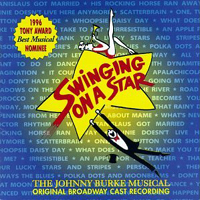 Original Broadway Cast, 1996 (After 9) No stars; not recommended. Subtitled “The Johnny Burke Musical,” this show tried to avoid being just another composer tribute revue by placing the songs of lyricist Burke within seven short vignettes of American life, ranging in time from the 1930s through the 1950s: a speakeasy sequence, a radio broadcast, a U.S.O. tour, and so on. Still, the net effect is that of an oldies songfest. Some items work better than others: Alvaleta Guess sings a sassy “Dr. Rhythm”; Lewis Cleale offers a heartfelt “Pennies From Heaven”; and Kathy Fitzgerald, Denise Faye, and Terry Burrell deliver a peppy “Personality.” But a lengthy tribute to the Hope-Crosby-Lamour “road”pictures is thoroughly lame, and overall, the recording comes across as a negligible collection of new performances of songs from vintage films. — David Barbour
Original Broadway Cast, 1996 (After 9) No stars; not recommended. Subtitled “The Johnny Burke Musical,” this show tried to avoid being just another composer tribute revue by placing the songs of lyricist Burke within seven short vignettes of American life, ranging in time from the 1930s through the 1950s: a speakeasy sequence, a radio broadcast, a U.S.O. tour, and so on. Still, the net effect is that of an oldies songfest. Some items work better than others: Alvaleta Guess sings a sassy “Dr. Rhythm”; Lewis Cleale offers a heartfelt “Pennies From Heaven”; and Kathy Fitzgerald, Denise Faye, and Terry Burrell deliver a peppy “Personality.” But a lengthy tribute to the Hope-Crosby-Lamour “road”pictures is thoroughly lame, and overall, the recording comes across as a negligible collection of new performances of songs from vintage films. — David Barbour
Swing!
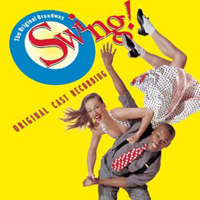 Original Broadway Cast, 1999 (Sony) No stars; not recommended. On Broadway, this revue’s main selling point was Lynne Taylor-Corbett’s ultra-strenuous choreography. What’s left on disc is a collection of mostly familiar swing tunes rendered with no particular distinction. If you feel the need to own another anthology of songs such as “It Don’t Mean a Thing (If It Ain’t Got That Swing),” “Boogie Woogie Bugle Boy,” and “Blues in the Night,” you might be interested, but be warned: Harold Wheeler’s orchestrations are surprisingly sedate. The recording does provide a showcase for top nightclub chanteuse Ann Hampton Callaway and rising Broadway ingenue Laura Benanti, but the former is heard to much better effect on her solo albums, and except for an effective rendition of “Cry Me a River,” the latter doesn’t really stand out here. — David Barbour
Original Broadway Cast, 1999 (Sony) No stars; not recommended. On Broadway, this revue’s main selling point was Lynne Taylor-Corbett’s ultra-strenuous choreography. What’s left on disc is a collection of mostly familiar swing tunes rendered with no particular distinction. If you feel the need to own another anthology of songs such as “It Don’t Mean a Thing (If It Ain’t Got That Swing),” “Boogie Woogie Bugle Boy,” and “Blues in the Night,” you might be interested, but be warned: Harold Wheeler’s orchestrations are surprisingly sedate. The recording does provide a showcase for top nightclub chanteuse Ann Hampton Callaway and rising Broadway ingenue Laura Benanti, but the former is heard to much better effect on her solo albums, and except for an effective rendition of “Cry Me a River,” the latter doesn’t really stand out here. — David Barbour
Sweet Smell of Success
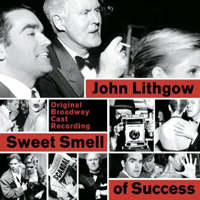 Original Broadway Cast, 2002 (Sony)
Original Broadway Cast, 2002 (Sony)  (3 / 5) With a book by John Guare, this musical based on the dark film Sweet Smell of Success found few fans during its three-month Broadway run, but the cast recording is very good and only seems to improve upon repeated listening. Composer Marvin Hamlisch and lyricist Craig Carnelia capture the essence of 1952 New York’s dark streets and smoky, neon-lit nightclubs, assisted by William David Brohn’s orchestrations, liberally peppered with brass licks, and Jeffrey Huard’s musical direction. When Hamlisch drags Carnelia into the Broadway underworld, the results are estimable: “The Column,” “Welcome to the Night,” and “Dirt” are terrific songs. The more jazz and pop-influenced numbers — “One Track Mind,” a solo tour-de-force sung by Jack Noseworthy as the musician Dallas, and “Don’t Know Where You Leave Off,” Noseworthy’s duet with strong-voiced ingenue Kelli O’Hara as his girlfriend — are also great, although some of the score’s more character-driven songs lack the daring of the other material. John Lithgow’s Tony Award-winning performance as the powerful and ruthless gossip columnist J.J. Hunsecker is represented only occasionally in song, but his hard-edged acting in what little of Guare’s bitterly humorous book is heard here makes up for the character’s lack of musical material and Lithgow’s vocal shortcomings. As the hungry press agent Sidney Falco, Brian d’Arcy James’ enthusiasm and stamina keep him flying high throughout — particularly in his early showcase number, “At the Fountain.” At 60 minutes in length, the recording is missing a fair amount of musical material; this fractures and muddies some sequences, breaking up the show’s continuity and making it sound more conventional than it was onstage. Still, overall, the album is a fine preservation of an underrated score. — Matthew Murray
(3 / 5) With a book by John Guare, this musical based on the dark film Sweet Smell of Success found few fans during its three-month Broadway run, but the cast recording is very good and only seems to improve upon repeated listening. Composer Marvin Hamlisch and lyricist Craig Carnelia capture the essence of 1952 New York’s dark streets and smoky, neon-lit nightclubs, assisted by William David Brohn’s orchestrations, liberally peppered with brass licks, and Jeffrey Huard’s musical direction. When Hamlisch drags Carnelia into the Broadway underworld, the results are estimable: “The Column,” “Welcome to the Night,” and “Dirt” are terrific songs. The more jazz and pop-influenced numbers — “One Track Mind,” a solo tour-de-force sung by Jack Noseworthy as the musician Dallas, and “Don’t Know Where You Leave Off,” Noseworthy’s duet with strong-voiced ingenue Kelli O’Hara as his girlfriend — are also great, although some of the score’s more character-driven songs lack the daring of the other material. John Lithgow’s Tony Award-winning performance as the powerful and ruthless gossip columnist J.J. Hunsecker is represented only occasionally in song, but his hard-edged acting in what little of Guare’s bitterly humorous book is heard here makes up for the character’s lack of musical material and Lithgow’s vocal shortcomings. As the hungry press agent Sidney Falco, Brian d’Arcy James’ enthusiasm and stamina keep him flying high throughout — particularly in his early showcase number, “At the Fountain.” At 60 minutes in length, the recording is missing a fair amount of musical material; this fractures and muddies some sequences, breaking up the show’s continuity and making it sound more conventional than it was onstage. Still, overall, the album is a fine preservation of an underrated score. — Matthew Murray
Sweet Charity
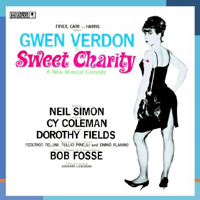 Original Broadway Cast, 1966 (Columbia)
Original Broadway Cast, 1966 (Columbia)  (5 / 5) This is a practically flawless recording of a Cy Coleman-Dorothy Fields score that ranks as one of the best of the 1960s. Bob Fosse’s adaptation of the Fellini film Nights of Cabiria starred Gwen Verdon in a beguiling, heartfelt performance as dance-hall girl Charity Hope Valentine. All of Verdon’s songs on the album are a pleasure, from the coy “You Should See Yourself” to the ecstatic “If My Friends Could See Me Now” and “I’m a Brass Band.” Her rendition of “Where Am I Going?” is heartbreaking; listen to her delivery of the final three words. Verdon finds all the warmth, humor, and vulnerability in Charity, selling the role from a vocal standpoint just as completely as she did with her world-class dancing onstage. The rest of the cast is also terrific: A full-voiced John McMartin sings the title song; Helen Gallagher and Thelma Oliver are equally effective in the big number “There’s Gotta Be Something Better Than This” and the much more intimate “Baby, Dream Your Dream”; James Luisi soars in the gorgeous “Too Many Tomorrows”; and the chorus women sex it up in the classic “Big Spender.” The musicians, playing Ralph Burns’ dynamite orchestrations, sound like the ultimate Broadway orchestra under Fred Werner’s musical direction; the overture and “The Rhythm of Life” will get your blood pumping and your feet tapping. The CD includes extended takes of “Rich Man’s Frug” and “I Love to Cry at Weddings,” opening-night interviews with Gallagher, Verdon, book writer Neil Simon, and celebrity guest Ethel Merman, and three great cuts of composer Coleman singing his songs with full accompaniment. — Matthew Murray
(5 / 5) This is a practically flawless recording of a Cy Coleman-Dorothy Fields score that ranks as one of the best of the 1960s. Bob Fosse’s adaptation of the Fellini film Nights of Cabiria starred Gwen Verdon in a beguiling, heartfelt performance as dance-hall girl Charity Hope Valentine. All of Verdon’s songs on the album are a pleasure, from the coy “You Should See Yourself” to the ecstatic “If My Friends Could See Me Now” and “I’m a Brass Band.” Her rendition of “Where Am I Going?” is heartbreaking; listen to her delivery of the final three words. Verdon finds all the warmth, humor, and vulnerability in Charity, selling the role from a vocal standpoint just as completely as she did with her world-class dancing onstage. The rest of the cast is also terrific: A full-voiced John McMartin sings the title song; Helen Gallagher and Thelma Oliver are equally effective in the big number “There’s Gotta Be Something Better Than This” and the much more intimate “Baby, Dream Your Dream”; James Luisi soars in the gorgeous “Too Many Tomorrows”; and the chorus women sex it up in the classic “Big Spender.” The musicians, playing Ralph Burns’ dynamite orchestrations, sound like the ultimate Broadway orchestra under Fred Werner’s musical direction; the overture and “The Rhythm of Life” will get your blood pumping and your feet tapping. The CD includes extended takes of “Rich Man’s Frug” and “I Love to Cry at Weddings,” opening-night interviews with Gallagher, Verdon, book writer Neil Simon, and celebrity guest Ethel Merman, and three great cuts of composer Coleman singing his songs with full accompaniment. — Matthew Murray
 Original London Cast, 1967 (CBS/Sony West End)
Original London Cast, 1967 (CBS/Sony West End)  (4 / 5) This second Sweet Charity is not quite perfect. The accents are a bit wonky. There are a number of internal cuts to the songs, and no “Charity’s Soliloquy” or “I’m the Greatest Individual.” The tempos and Ralph Burns’s gently revised orchestrations aren’t as sharp as on the Broadway recording. But, otherwise, this is a choice take on the material. As Charity, Juliet Prowse lacks the huggable personality and sleeve-worn vulnerability that made Gwen Verdon’s performance a treasure, but she stakes her claim to being the second best exponent of the role on record with gutsy renditions of the songs that squeeze every bit of dramatic juice from the character’s hard-bitten background. For that reason, she’s better in the sharper numbers (“You Should See Yourself,” “If My Friends Could See Me Now”) than the sweeter or darker stuff, but Prowse is a genuine pleasure in any event. So is pretty much everyone else, with Rod McLennan crooning well as Oscar, John Keston providing a rich “Too Many Tomorrows,” and Josephine Blake and Paula Kelly offering spirited backup as Charity’s dance-hall colleagues Nickie and Helene. The OBCR may be irreplaceable, but for a flavorful spin on the property before it started going downhill, this is as good as the runners-up get. — M.M.
(4 / 5) This second Sweet Charity is not quite perfect. The accents are a bit wonky. There are a number of internal cuts to the songs, and no “Charity’s Soliloquy” or “I’m the Greatest Individual.” The tempos and Ralph Burns’s gently revised orchestrations aren’t as sharp as on the Broadway recording. But, otherwise, this is a choice take on the material. As Charity, Juliet Prowse lacks the huggable personality and sleeve-worn vulnerability that made Gwen Verdon’s performance a treasure, but she stakes her claim to being the second best exponent of the role on record with gutsy renditions of the songs that squeeze every bit of dramatic juice from the character’s hard-bitten background. For that reason, she’s better in the sharper numbers (“You Should See Yourself,” “If My Friends Could See Me Now”) than the sweeter or darker stuff, but Prowse is a genuine pleasure in any event. So is pretty much everyone else, with Rod McLennan crooning well as Oscar, John Keston providing a rich “Too Many Tomorrows,” and Josephine Blake and Paula Kelly offering spirited backup as Charity’s dance-hall colleagues Nickie and Helene. The OBCR may be irreplaceable, but for a flavorful spin on the property before it started going downhill, this is as good as the runners-up get. — M.M.
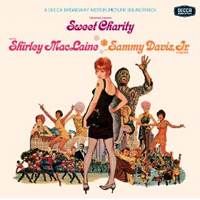 Film Soundtrack, 1969 (Decca)
Film Soundtrack, 1969 (Decca)  (2 / 5) Shirley MacLaine lacks much of Gwen Verdon’s conviction in the title role of Sweet Charity; she finds the character’s basic mood, but fails to offer distinctive vocal renditions of any of her numbers. The new songs written for the score by Cy Coleman and Dorothy Fields, “My Personal Property” and “It’s a Nice Face,” are not the equals of those they replaced. The audio quality of many of the tracks is poor, and slipshod editing prevents the soundtrack album from being an accurate record of what’s heard in the film. But some of the performances are excellent: Chita Rivera as a tough but Ioving Nickie, Sammy Davis, Jr. as a thoroughly magnetic “Big Daddy” in “The Rhythm of Life,” and a jovial Stubby Kaye as Herman in “I Love to Cry at Weddings.” John McMartin recreates his definitive Oscar, but he gets only one song here — a rewritten, less-exciting version of the title number. Joseph Gershenson supervises and conducts the music with verve, and, audio quality aside, the orchestra sounds great. — M.M.
(2 / 5) Shirley MacLaine lacks much of Gwen Verdon’s conviction in the title role of Sweet Charity; she finds the character’s basic mood, but fails to offer distinctive vocal renditions of any of her numbers. The new songs written for the score by Cy Coleman and Dorothy Fields, “My Personal Property” and “It’s a Nice Face,” are not the equals of those they replaced. The audio quality of many of the tracks is poor, and slipshod editing prevents the soundtrack album from being an accurate record of what’s heard in the film. But some of the performances are excellent: Chita Rivera as a tough but Ioving Nickie, Sammy Davis, Jr. as a thoroughly magnetic “Big Daddy” in “The Rhythm of Life,” and a jovial Stubby Kaye as Herman in “I Love to Cry at Weddings.” John McMartin recreates his definitive Oscar, but he gets only one song here — a rewritten, less-exciting version of the title number. Joseph Gershenson supervises and conducts the music with verve, and, audio quality aside, the orchestra sounds great. — M.M.
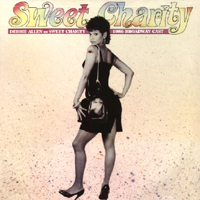 Broadway Cast, 1986 (EMI)
Broadway Cast, 1986 (EMI)  (1 / 5) What a step down, holy cow! You know you’re in trouble from the first seconds of this recording, when the musicians playing Ralph Burns’ orchestrations under Fred Werner’s baton lugubriously bleat out the opening salvos of the once-glorious Sweet Charity overture. Add in Debbie Allen’s self-indulgent performance as Charity, complete with overwrought vocal stylings (“I’m the Bravest Individual” is practically unlistenable), and the result is a misguided performance of the score with almost none of the thrills and charms to be found in other recordings. Only Michael Rupert as Oscar, Bebe Neuwirth as Nickie, and Mark Jacoby as Vittorio Vidal save the album from being a complete botch; Jacoby offers the best “Too Many Tomorrows” on record, and Rupert does a nice job with the film version of the title song. — M.M.
(1 / 5) What a step down, holy cow! You know you’re in trouble from the first seconds of this recording, when the musicians playing Ralph Burns’ orchestrations under Fred Werner’s baton lugubriously bleat out the opening salvos of the once-glorious Sweet Charity overture. Add in Debbie Allen’s self-indulgent performance as Charity, complete with overwrought vocal stylings (“I’m the Bravest Individual” is practically unlistenable), and the result is a misguided performance of the score with almost none of the thrills and charms to be found in other recordings. Only Michael Rupert as Oscar, Bebe Neuwirth as Nickie, and Mark Jacoby as Vittorio Vidal save the album from being a complete botch; Jacoby offers the best “Too Many Tomorrows” on record, and Rupert does a nice job with the film version of the title song. — M.M.
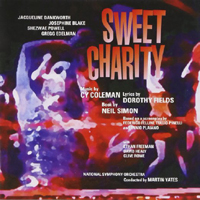 Studio Cast, 1995 (JAY, 2CDs)
Studio Cast, 1995 (JAY, 2CDs)  (2 / 5) The big benefit of this recording is its completeness: Every musical number from both the stage and film versions of Sweet Charity can be found here, plus all of the dance music. The downside is that conductor Martin Yates, leading the National Symphony Orchestra, slows down the tempi significantly. Jacqueline Dankworth is vocally the strongest Charity yet recorded, but she’s rather “hard,” failing to tap into the character’s vulnerability and starry-eyed resilience. She leads a mostly fine cast: Gregg Edelman as a smoothly sung Oscar, Clive Rowe as a wild “Big Daddy,” and Josephine Blake and Shezwae Powell as Nickie and Helene. Only David Healey’s Herman is surprisingly weak, making “I Love to Cry at Weddings” a skippable track. — M.M.
(2 / 5) The big benefit of this recording is its completeness: Every musical number from both the stage and film versions of Sweet Charity can be found here, plus all of the dance music. The downside is that conductor Martin Yates, leading the National Symphony Orchestra, slows down the tempi significantly. Jacqueline Dankworth is vocally the strongest Charity yet recorded, but she’s rather “hard,” failing to tap into the character’s vulnerability and starry-eyed resilience. She leads a mostly fine cast: Gregg Edelman as a smoothly sung Oscar, Clive Rowe as a wild “Big Daddy,” and Josephine Blake and Shezwae Powell as Nickie and Helene. Only David Healey’s Herman is surprisingly weak, making “I Love to Cry at Weddings” a skippable track. — M.M.
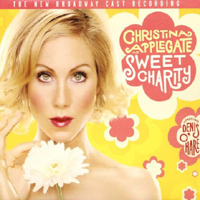 Broadway Cast, 2005 (DRG)
Broadway Cast, 2005 (DRG)  (2 / 5) An unapologetic star vehicle, Sweet Charity is only as good as its leading lady — who, in even the best of cases, will forever be compared to Gwen Verdon. Christina Applegate is a hard worker, and a trouper; during a nightmarish out-of-town tryout period, she sustained an injury that almost scuttled the production. But she is at best okay in the role, even on disc. With a thin voice and not a lot of verve, she can’t do much with the character, and not a single one of her renditions of the songs is memorable for any reason, good or bad. Denis O’Hare, cast almost dangerously to type as Oscar, displays his usual, hyper-neurotic stage persona. No one today does this kind of thing better, so his work is enjoyable (and he’s been given the rarely heard song “A Good Impression”) but not much different than in any other show. As Nickie and Helene, Janine LaManna and Kyra Da Costa come across very well. So does Paul Schoeffler as Vittorio, providing the closest this recording gets to a killer vocal with an emphatic “Too Many Tomorrows.” Substandard orchestrations by Don Sebesky, who cut down Ralph Burns’s peerless original charts, wrap the package. All of that said, with the exception of a funkified version of “The Rhythm of Life” that represents a painful, pitiful reinterpretation of the show-stopping real deal, most of the numbers still charm and amuse. The dazzling bonus tracks feature performances of several songs from the score by Cy Coleman and, on “I’m the Bravest Individual,” Dorothy Fields as well. These tracks in themselves arguably make this album necessary for completists. —M.M.
(2 / 5) An unapologetic star vehicle, Sweet Charity is only as good as its leading lady — who, in even the best of cases, will forever be compared to Gwen Verdon. Christina Applegate is a hard worker, and a trouper; during a nightmarish out-of-town tryout period, she sustained an injury that almost scuttled the production. But she is at best okay in the role, even on disc. With a thin voice and not a lot of verve, she can’t do much with the character, and not a single one of her renditions of the songs is memorable for any reason, good or bad. Denis O’Hare, cast almost dangerously to type as Oscar, displays his usual, hyper-neurotic stage persona. No one today does this kind of thing better, so his work is enjoyable (and he’s been given the rarely heard song “A Good Impression”) but not much different than in any other show. As Nickie and Helene, Janine LaManna and Kyra Da Costa come across very well. So does Paul Schoeffler as Vittorio, providing the closest this recording gets to a killer vocal with an emphatic “Too Many Tomorrows.” Substandard orchestrations by Don Sebesky, who cut down Ralph Burns’s peerless original charts, wrap the package. All of that said, with the exception of a funkified version of “The Rhythm of Life” that represents a painful, pitiful reinterpretation of the show-stopping real deal, most of the numbers still charm and amuse. The dazzling bonus tracks feature performances of several songs from the score by Cy Coleman and, on “I’m the Bravest Individual,” Dorothy Fields as well. These tracks in themselves arguably make this album necessary for completists. —M.M.
Sweeney Todd
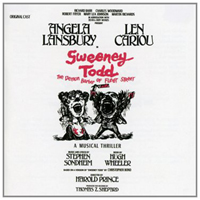 Original Broadway Cast, 1978 (RCA, 2CDs)
Original Broadway Cast, 1978 (RCA, 2CDs)  (5 / 5) Every musical theatre fan has a personal favorite Sondheim score, and the man’s oeuvre is so rich and diverse that it’s impossible to argue what is truly his “best” work. But few people if any would dispute that Sweeney Todd, the Demon Barber of Fleet Street is Sondheim’s grandest, largest-scale achievement. It’s also perhaps the work he’s most closely associated with, having achieved high-profile status in theaters and opera houses around the world, as well as having served as the basis for a popular film version. Adapted from the play by Christopher Bond, which in turn is a dramatic interpretation of an English urban legend, Sweeney Todd tells of a barber who slits the throats of his customers and consigns their dead bodies to his landlady, Mrs. Lovett, who bakes them into meat pies. The show is billed as “a musical thriller,” but Sondheim and book writer Hugh Wheeler focus on its themes of revenge, corruption, and obsession, adding more complex elements of humanity to the musical horror. That approach clearly worked, as Sweeney Todd is widely acknowledged as a musical theater masterpiece. The original Broadway cast recording remains definitive; it represents nearly the entire score and book of the show, and it’s thrilling from start to finish. As the vengeful barber, Len Cariou is sexy, sympathetic, and terrifying all at once. He’s superbly partnered by Angela Lansbury, providing comedic relief and giving a career defining performance as Mrs. Lovett. The duo’s incredible chemistry comes to a high point with the famous Act 1 finale “A Little Priest,” when Sweeney and Lovett suddenly realize how to discard the remains of his victims as well as provide her with quality meat for her pies; Cariou and Lansbury fiendishly toy with Sondheim’s brilliant lyrics, making the song simultaneously hilarious and disturbing. The two are given excellent support by the rest of the principal company: Merle Louise’s demented Beggar Woman, Ken Jennings’ doe-eyed Tobias, Edmund Lyndeck’s lecherous Judge Turpin, and Sarah Rice and Victor Garber as the innocent lovers Johanna and Anthony are all perfect. Jonathan Tunick’s grandly operatic orchestrations have never been equaled, and Paul Gemignani conducts with a fearless, steady hand that keeps the entire piece moving seamlessly. There will always be room for differences of opinion as to what score represents the very best of Sondheim, but when it comes to Sweeney Todd, only one recording is truly essential: this one. — Matt Koplik
(5 / 5) Every musical theatre fan has a personal favorite Sondheim score, and the man’s oeuvre is so rich and diverse that it’s impossible to argue what is truly his “best” work. But few people if any would dispute that Sweeney Todd, the Demon Barber of Fleet Street is Sondheim’s grandest, largest-scale achievement. It’s also perhaps the work he’s most closely associated with, having achieved high-profile status in theaters and opera houses around the world, as well as having served as the basis for a popular film version. Adapted from the play by Christopher Bond, which in turn is a dramatic interpretation of an English urban legend, Sweeney Todd tells of a barber who slits the throats of his customers and consigns their dead bodies to his landlady, Mrs. Lovett, who bakes them into meat pies. The show is billed as “a musical thriller,” but Sondheim and book writer Hugh Wheeler focus on its themes of revenge, corruption, and obsession, adding more complex elements of humanity to the musical horror. That approach clearly worked, as Sweeney Todd is widely acknowledged as a musical theater masterpiece. The original Broadway cast recording remains definitive; it represents nearly the entire score and book of the show, and it’s thrilling from start to finish. As the vengeful barber, Len Cariou is sexy, sympathetic, and terrifying all at once. He’s superbly partnered by Angela Lansbury, providing comedic relief and giving a career defining performance as Mrs. Lovett. The duo’s incredible chemistry comes to a high point with the famous Act 1 finale “A Little Priest,” when Sweeney and Lovett suddenly realize how to discard the remains of his victims as well as provide her with quality meat for her pies; Cariou and Lansbury fiendishly toy with Sondheim’s brilliant lyrics, making the song simultaneously hilarious and disturbing. The two are given excellent support by the rest of the principal company: Merle Louise’s demented Beggar Woman, Ken Jennings’ doe-eyed Tobias, Edmund Lyndeck’s lecherous Judge Turpin, and Sarah Rice and Victor Garber as the innocent lovers Johanna and Anthony are all perfect. Jonathan Tunick’s grandly operatic orchestrations have never been equaled, and Paul Gemignani conducts with a fearless, steady hand that keeps the entire piece moving seamlessly. There will always be room for differences of opinion as to what score represents the very best of Sondheim, but when it comes to Sweeney Todd, only one recording is truly essential: this one. — Matt Koplik
 New York Philharmonic Concert Cast, 2000 (N.Y. Philharmonic Special Editions, 2CDs)
New York Philharmonic Concert Cast, 2000 (N.Y. Philharmonic Special Editions, 2CDs)  (3 / 5) Now, assuming that you’ve done your homework, purchased the original cast album of Sweeney Todd, and thoroughly familiarized yourself with it, you can start having fun with other interpretations. In May of 2000, Lonny Price directed a semi-staged concert version of Sweeney for the New York Philharmonic in honor of Sondheim’s 70th birthday, and a live recording of the event was issued in a special limited edition. With a starry cast, an audibly thrilled audience, and the incomparable Philharmonic playing the score with searing focus, there’s a palpable energy to this performance; the applause that greets stars George Hearn and Patti LuPone upon their entrances and the knowing laughter that punches every line of “A Little Priest” are just a few examples. And yet, the heady, almost giddy atmosphere keeps this recording from ever truly soaring to great heights. While LuPone and Hearn are vocally peerless and blend together sensationally in “My Friends” and “Priest,” they both have a habit of indulging the audience rather than mining their characters for full dramatic potential. (LuPone provided a more well-defined Mrs. Lovett five years later in John Doyle’s stripped down revival; see review below). Neil Patrick Harris is an endearing if somewhat vocally underwhelming Tobias; Heidi Grant Murphy is a lovely Johanna, second only to Sarah Rice; and Audra McDonald is, of course, fantastic as the Beggar Woman. This may not be the most moving or compelling Sweeney Todd you’ll ever hear, but it’s pretty exciting. — M.K.
(3 / 5) Now, assuming that you’ve done your homework, purchased the original cast album of Sweeney Todd, and thoroughly familiarized yourself with it, you can start having fun with other interpretations. In May of 2000, Lonny Price directed a semi-staged concert version of Sweeney for the New York Philharmonic in honor of Sondheim’s 70th birthday, and a live recording of the event was issued in a special limited edition. With a starry cast, an audibly thrilled audience, and the incomparable Philharmonic playing the score with searing focus, there’s a palpable energy to this performance; the applause that greets stars George Hearn and Patti LuPone upon their entrances and the knowing laughter that punches every line of “A Little Priest” are just a few examples. And yet, the heady, almost giddy atmosphere keeps this recording from ever truly soaring to great heights. While LuPone and Hearn are vocally peerless and blend together sensationally in “My Friends” and “Priest,” they both have a habit of indulging the audience rather than mining their characters for full dramatic potential. (LuPone provided a more well-defined Mrs. Lovett five years later in John Doyle’s stripped down revival; see review below). Neil Patrick Harris is an endearing if somewhat vocally underwhelming Tobias; Heidi Grant Murphy is a lovely Johanna, second only to Sarah Rice; and Audra McDonald is, of course, fantastic as the Beggar Woman. This may not be the most moving or compelling Sweeney Todd you’ll ever hear, but it’s pretty exciting. — M.K.
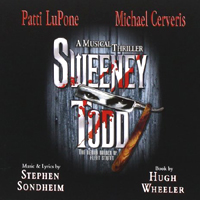 Broadway Cast, 2005 (Nonesuch, 2CDs)
Broadway Cast, 2005 (Nonesuch, 2CDs)  (4 / 5) When Sweeney was first revived on Broadway in 1990, at Circle-in-the-Square, that production (which yielded no cast album) was nicknamed “Teeny Todd” for its downsizing from the Grand Guignol style of the original production to a far more intimate affair, disposing of the chorus and large orchestra. Audiences were thrown by seeing and hearing the show performed on such a small scale after a decade of its having played in large theaters and opera houses. But even that staging couldn’t prepare Broadway for British director John Doyle’s re-conceptualized production 15 years later, set in an insane asylum. Doyle used only 10 actors and famously had them double as the orchestra throughout the show. The results are fascinating and, ultimately, rewarding; though the score loses its grandeur, the show becomes chillingly personal. The excellent cast/orchestra, led by Sondheim vets Michael Cerveris and Patti LuPone, glides through the score with assurance, each of them switching back and forth from actor to musician seamlessly. Cerveris makes for a particularly brooding Sweeney, and LuPone — more disciplined and restrained than in her New York Philharmonic performance (see review above) — is a sexy Mrs. Lovett. While everyone gets a chance to shine, the true star here is orchestrator Sarah Travis. Rather than reduce Jonathan Tunick’s original charts, Travis completely restyled Sondheim’s score to match the frightening intimacy of Doyle’s vision. Who knew that “Johanna” could sound so beautiful with only accordion and cello accompaniment? Even though “City on Fire” is sadly not included here, and some listeners may miss the impact of a large chorus, this is an excellent addition to the Sweeney discography and a wonderful opportunity for fans to hear a brilliant score in an entirely different way — M.K.
(4 / 5) When Sweeney was first revived on Broadway in 1990, at Circle-in-the-Square, that production (which yielded no cast album) was nicknamed “Teeny Todd” for its downsizing from the Grand Guignol style of the original production to a far more intimate affair, disposing of the chorus and large orchestra. Audiences were thrown by seeing and hearing the show performed on such a small scale after a decade of its having played in large theaters and opera houses. But even that staging couldn’t prepare Broadway for British director John Doyle’s re-conceptualized production 15 years later, set in an insane asylum. Doyle used only 10 actors and famously had them double as the orchestra throughout the show. The results are fascinating and, ultimately, rewarding; though the score loses its grandeur, the show becomes chillingly personal. The excellent cast/orchestra, led by Sondheim vets Michael Cerveris and Patti LuPone, glides through the score with assurance, each of them switching back and forth from actor to musician seamlessly. Cerveris makes for a particularly brooding Sweeney, and LuPone — more disciplined and restrained than in her New York Philharmonic performance (see review above) — is a sexy Mrs. Lovett. While everyone gets a chance to shine, the true star here is orchestrator Sarah Travis. Rather than reduce Jonathan Tunick’s original charts, Travis completely restyled Sondheim’s score to match the frightening intimacy of Doyle’s vision. Who knew that “Johanna” could sound so beautiful with only accordion and cello accompaniment? Even though “City on Fire” is sadly not included here, and some listeners may miss the impact of a large chorus, this is an excellent addition to the Sweeney discography and a wonderful opportunity for fans to hear a brilliant score in an entirely different way — M.K.
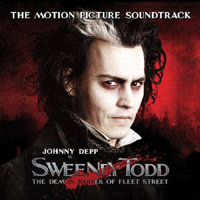 Film Soundtrack, 2007 (Nonesuch)
Film Soundtrack, 2007 (Nonesuch)  (2 / 5) Tim Burton’s film adaptation of Sweeney Todd is terrific or terrible, depending on whom you ask. Opting for a basically intimate film, Burton shied away from all things operatic, cutting any material that was sung by the chorus in the original score (“The Ballad of Sweeney Todd” and all of its reprises, for starters) and focusing solely on his principal cast. This makes for an arguably excellent film but a poor representation of the stage show and an uneven listening experience, the approach working better for some sections of the score than others. The singing voices of the movie’s cast, led by Johnny Depp and Helena Bonham Carter, don’t allow them to revel in the lushness of Sondheim’s music. Without the film’s visuals, some listeners to the soundtrack may wonder why Carter whispers most of “The Worst Pies in London,” or why “Pirelli’s Miracle Elixir” is cut in half. Others may balk at Depp’s crooning, rock-tinged style of singing, less George Hearn and more David Bowie. Still, even without the benefit of seeing the film, this recording offers some perks. Broadway maestro Paul Gemignani leads a huge Hollywood orchestra that tears into the score with incredible intensity. (The orchestrations are Jonathan Tunick’s originals, with some changes of key and other minor alterations.) “Not While I’m Around” is sung beautifully by Ed Sanders, the first child actor to portray Tobias in a major production of Sweeney. The entire supporting cast is strong, with Laura Michelle Kelly making a memorable impression as the Beggar Woman even though Burton eliminated much of her role. — M.K.
(2 / 5) Tim Burton’s film adaptation of Sweeney Todd is terrific or terrible, depending on whom you ask. Opting for a basically intimate film, Burton shied away from all things operatic, cutting any material that was sung by the chorus in the original score (“The Ballad of Sweeney Todd” and all of its reprises, for starters) and focusing solely on his principal cast. This makes for an arguably excellent film but a poor representation of the stage show and an uneven listening experience, the approach working better for some sections of the score than others. The singing voices of the movie’s cast, led by Johnny Depp and Helena Bonham Carter, don’t allow them to revel in the lushness of Sondheim’s music. Without the film’s visuals, some listeners to the soundtrack may wonder why Carter whispers most of “The Worst Pies in London,” or why “Pirelli’s Miracle Elixir” is cut in half. Others may balk at Depp’s crooning, rock-tinged style of singing, less George Hearn and more David Bowie. Still, even without the benefit of seeing the film, this recording offers some perks. Broadway maestro Paul Gemignani leads a huge Hollywood orchestra that tears into the score with incredible intensity. (The orchestrations are Jonathan Tunick’s originals, with some changes of key and other minor alterations.) “Not While I’m Around” is sung beautifully by Ed Sanders, the first child actor to portray Tobias in a major production of Sweeney. The entire supporting cast is strong, with Laura Michelle Kelly making a memorable impression as the Beggar Woman even though Burton eliminated much of her role. — M.K.
 London Cast, 2012 (First Night)
London Cast, 2012 (First Night)  (1 / 5) Premiering at the Chichester Festival Theatre in England, this revival of Sweeney Todd immediately transferred to the West End, where it enjoyed a very successful run and numerous accolades. While many, including Sondheim himself, have sung the production’s praises, and indeed it may have worked in the theater, this recording does very little to argue for its artistic merits. It doesn’t help that what we have here is really only a selection of highlights — although that isn’t how the album is labeled. Among the songs and sequences not included are “Poor Thing,” “Pirelli’s Miracle Elixir,” and “Green Finch and Linnet Bird.” These major omissions aside, there are other elements that make this recording nonessential. While the orchestra heard here is smallish, the orchestrations weren’t rewritten accordingly (as they were by Sarah Travis for the John Doyle production), but instead are just pared-down versions of the Jonathan Tunick originals. As a result, the score sounds tinny. On the plus side, the two critically acclaimed leads, Michael Ball and Imelda Staunton, provide fully realized performances as Sweeney and Mrs. Lovett. Though Ball’s voice is often too young-sounding and he therefore lacks a certain gravitas for the role, his “Epiphany” is strong, and Ball takes a note from Len Cariou in playing Sweeney with a restrained intensity throughout. Staunton is vocally on par with Lansbury, though her Lovett is more fiery and sinister, making her sparring with Ball on “A Little Priest” more frightening. Still, overall, this recording is the least satisfying of the stage cast albums reviewed here. — M.K.
(1 / 5) Premiering at the Chichester Festival Theatre in England, this revival of Sweeney Todd immediately transferred to the West End, where it enjoyed a very successful run and numerous accolades. While many, including Sondheim himself, have sung the production’s praises, and indeed it may have worked in the theater, this recording does very little to argue for its artistic merits. It doesn’t help that what we have here is really only a selection of highlights — although that isn’t how the album is labeled. Among the songs and sequences not included are “Poor Thing,” “Pirelli’s Miracle Elixir,” and “Green Finch and Linnet Bird.” These major omissions aside, there are other elements that make this recording nonessential. While the orchestra heard here is smallish, the orchestrations weren’t rewritten accordingly (as they were by Sarah Travis for the John Doyle production), but instead are just pared-down versions of the Jonathan Tunick originals. As a result, the score sounds tinny. On the plus side, the two critically acclaimed leads, Michael Ball and Imelda Staunton, provide fully realized performances as Sweeney and Mrs. Lovett. Though Ball’s voice is often too young-sounding and he therefore lacks a certain gravitas for the role, his “Epiphany” is strong, and Ball takes a note from Len Cariou in playing Sweeney with a restrained intensity throughout. Staunton is vocally on par with Lansbury, though her Lovett is more fiery and sinister, making her sparring with Ball on “A Little Priest” more frightening. Still, overall, this recording is the least satisfying of the stage cast albums reviewed here. — M.K.
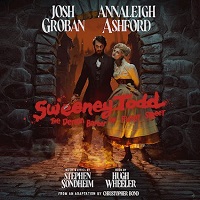 Broadway Cast, 2023 (Warner/Arts Music/Reprise)
Broadway Cast, 2023 (Warner/Arts Music/Reprise)  (3 / 5) No Broadway production of Sweeney Todd has aimed to match the scale of the 1979 original — until the 2023 revival that starred Josh Groban and Annaleigh Ashford. Like the production itself, the cast recording is a clean and respectful presentation of Sondheim’s masterpiece, but that respect and cleanliness constantly keeps the recording from reaching any dramatic heights. As Sweeney, the honey-voiced Groban sounds gorgeous on every song, especially in the more tender moments, such as “My Friends.” But Groban struggles to channel the rage and madness of the character, and so, for example, his “Epiphany” is healthily sung but lacking in chills. Ashford, meanwhile, brings plenty of humor and vocal sweetness to Mrs. Lovett but never gets to the messy ruthlessness lying beneath the character’s jokey surface. The much touted 26-piece orchestra sounds nice and lush playing the original orchestrations, but Alex Lacaimore’s courteous and often serene conducting keeps the musicians from truly ripping into Tunick’s charts. Also, while the recording is packed with strong singers besides Groban and Ashford, almost everyone sings with a modern sensibility and accents that clash with the classical tone of Sondheim’s score. Two notable exceptions are Jon Rapson and Nicholas Christopher, successfully campy as Beadle Bamford and Pirelli, respectively. Gaten Matarrazo is endearing as Tobias, and Ruthie Ann Miles’ Begger Woman brings a little bit of grit to the proceedings. While this recording isn’t much of a thrill, it still gives us a well-sung Sweeney, and is therefore enjoyable on that level. — M.K.
(3 / 5) No Broadway production of Sweeney Todd has aimed to match the scale of the 1979 original — until the 2023 revival that starred Josh Groban and Annaleigh Ashford. Like the production itself, the cast recording is a clean and respectful presentation of Sondheim’s masterpiece, but that respect and cleanliness constantly keeps the recording from reaching any dramatic heights. As Sweeney, the honey-voiced Groban sounds gorgeous on every song, especially in the more tender moments, such as “My Friends.” But Groban struggles to channel the rage and madness of the character, and so, for example, his “Epiphany” is healthily sung but lacking in chills. Ashford, meanwhile, brings plenty of humor and vocal sweetness to Mrs. Lovett but never gets to the messy ruthlessness lying beneath the character’s jokey surface. The much touted 26-piece orchestra sounds nice and lush playing the original orchestrations, but Alex Lacaimore’s courteous and often serene conducting keeps the musicians from truly ripping into Tunick’s charts. Also, while the recording is packed with strong singers besides Groban and Ashford, almost everyone sings with a modern sensibility and accents that clash with the classical tone of Sondheim’s score. Two notable exceptions are Jon Rapson and Nicholas Christopher, successfully campy as Beadle Bamford and Pirelli, respectively. Gaten Matarrazo is endearing as Tobias, and Ruthie Ann Miles’ Begger Woman brings a little bit of grit to the proceedings. While this recording isn’t much of a thrill, it still gives us a well-sung Sweeney, and is therefore enjoyable on that level. — M.K.
Sunset Boulevard
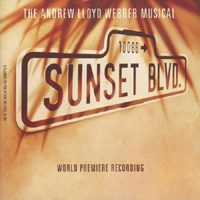 World Premiere Recording, 1993 (Polydor, 2CDs)
World Premiere Recording, 1993 (Polydor, 2CDs)  (3 / 5) Andrew Lloyd Webber heard a semi-operatic, sung-through musical in Billy Wilder’s 1950 melodrama film noir, but he made a mistake in choosing Don Black and Christopher Hampton to write the prosaic lyrics, overrun as they are with tiresome exposition set to the same few melody lines. Whatever may be said about the composer’s cribbing from Puccini and Rachmaninoff, when Lloyd Webber gets to the full-blown arias for Norma Desmond, he supplies steel-trap tunes: “With One Look,” “The Perfect Year,” and “As If We Never Said Goodbye” rank with his best. The world premiere production of Sunset Boulevard in London starred Patti LuPone, whose often-remarked-upon trouble with consonants is no problem here; on the contrary, her enunciation is impeccable, and her characterization fascinates. With her fluid reading of the songs and her delivery of what dialogue there is on the recording, LuPone presents the self-deluded Norma Desmond as someone who’s surrendered spontaneity to a magnificent artificiality. Her Norma is a defeated woman falling from a great height. Kevin Anderson sings and orates forcibly as Joe Gillis, the screenwriter supporting Desmond in her addled belief that she can make a return to film. Daniel Benzali is a sensitive Max, Madame’s butler and former husband; and Meredith Braun is fine as Betty Schaefer, the would-be screenwriter who falls for Joe. The sumptuous orchestrations by David Cullen and Lloyd Webber himself possess 1950s-film-soundtrack fervor. — David Finkle
(3 / 5) Andrew Lloyd Webber heard a semi-operatic, sung-through musical in Billy Wilder’s 1950 melodrama film noir, but he made a mistake in choosing Don Black and Christopher Hampton to write the prosaic lyrics, overrun as they are with tiresome exposition set to the same few melody lines. Whatever may be said about the composer’s cribbing from Puccini and Rachmaninoff, when Lloyd Webber gets to the full-blown arias for Norma Desmond, he supplies steel-trap tunes: “With One Look,” “The Perfect Year,” and “As If We Never Said Goodbye” rank with his best. The world premiere production of Sunset Boulevard in London starred Patti LuPone, whose often-remarked-upon trouble with consonants is no problem here; on the contrary, her enunciation is impeccable, and her characterization fascinates. With her fluid reading of the songs and her delivery of what dialogue there is on the recording, LuPone presents the self-deluded Norma Desmond as someone who’s surrendered spontaneity to a magnificent artificiality. Her Norma is a defeated woman falling from a great height. Kevin Anderson sings and orates forcibly as Joe Gillis, the screenwriter supporting Desmond in her addled belief that she can make a return to film. Daniel Benzali is a sensitive Max, Madame’s butler and former husband; and Meredith Braun is fine as Betty Schaefer, the would-be screenwriter who falls for Joe. The sumptuous orchestrations by David Cullen and Lloyd Webber himself possess 1950s-film-soundtrack fervor. — David Finkle
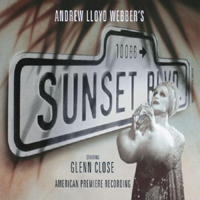 American Premiere Recording, 1994 (Polydor, 2CDs)
American Premiere Recording, 1994 (Polydor, 2CDs)  (2 / 5) Whereas Patti LuPone’s recorded performance as Norma Desmond in Sunset Boulevard may surpass what she accomplished onstage, Glenn Close, who played the role in Los Angeles and on Broadway, sounds crotchety and almost laughably desperate on this cast album. When speaking, Close comes across as an aging Ophelia. (The effect worked better live.) When singing the hothouse solos “With One Look” and “As If We Never Said Goodbye,” the star sometimes strides confidently into a note and disports herself much more vigorously than one might have expected, yet she does have problems in terms of range and volume . Too often, her shifting from chest voice to head voice and back again is the aural equivalent of watching a hurdler clear obstacles. Also, more than seems appropriate, much of her delivery sounds like whispering. Alan Campbell plays Joe Gillis and is more than adequate in his singing, yet not entirely convincing in the role. Judy Kuhn as Betty is, as always, lovely and real; what a lustrous voice she has. As Max, George Hearn adds another oddball performance to his list of Broadway oddballs. Musical director Paul Bogaev brings out all the overheated drama of Lloyd Webber’s melodies, which include a sweeping opening theme. — D.F.
(2 / 5) Whereas Patti LuPone’s recorded performance as Norma Desmond in Sunset Boulevard may surpass what she accomplished onstage, Glenn Close, who played the role in Los Angeles and on Broadway, sounds crotchety and almost laughably desperate on this cast album. When speaking, Close comes across as an aging Ophelia. (The effect worked better live.) When singing the hothouse solos “With One Look” and “As If We Never Said Goodbye,” the star sometimes strides confidently into a note and disports herself much more vigorously than one might have expected, yet she does have problems in terms of range and volume . Too often, her shifting from chest voice to head voice and back again is the aural equivalent of watching a hurdler clear obstacles. Also, more than seems appropriate, much of her delivery sounds like whispering. Alan Campbell plays Joe Gillis and is more than adequate in his singing, yet not entirely convincing in the role. Judy Kuhn as Betty is, as always, lovely and real; what a lustrous voice she has. As Max, George Hearn adds another oddball performance to his list of Broadway oddballs. Musical director Paul Bogaev brings out all the overheated drama of Lloyd Webber’s melodies, which include a sweeping opening theme. — D.F.
 Original Canadian Cast, 1995 (Polydor)
Original Canadian Cast, 1995 (Polydor)  (2 / 5) Diahann Carroll fans are the likeliest targets for this recording, which cuts out a good deal of material that may be heard on the two previous Sunset Boulevard albums. But what’s gone isn’t missed, since the show’s heavy-handed satire of Hollywood’s eat-’em-alive attitudes can become tedious. Carroll, an unexpected choice to play silent-screen-vamp Norma Desmond, gives a viable performance. Her Norma is full-bodied and commanding, and she brings interesting nuance to “New Ways to Dream” in particular. Rex Smith has an engaging way about him as Joe Gillis, Walter Charles lends depth to the loyal Max, Anita Louise Combe is a sweet Betty Schaefer, and Jeffrey Huard’s conducting is stately. — D.F.
(2 / 5) Diahann Carroll fans are the likeliest targets for this recording, which cuts out a good deal of material that may be heard on the two previous Sunset Boulevard albums. But what’s gone isn’t missed, since the show’s heavy-handed satire of Hollywood’s eat-’em-alive attitudes can become tedious. Carroll, an unexpected choice to play silent-screen-vamp Norma Desmond, gives a viable performance. Her Norma is full-bodied and commanding, and she brings interesting nuance to “New Ways to Dream” in particular. Rex Smith has an engaging way about him as Joe Gillis, Walter Charles lends depth to the loyal Max, Anita Louise Combe is a sweet Betty Schaefer, and Jeffrey Huard’s conducting is stately. — D.F.
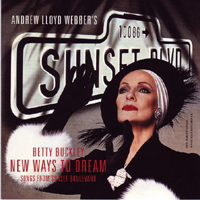 Betty Buckley: New Ways to Dream: Songs from Sunset Boulevard, 1995 (Polygram)
Betty Buckley: New Ways to Dream: Songs from Sunset Boulevard, 1995 (Polygram)  (3 / 5) When Betty Buckley replaced Glenn Close in the Broadway production of Sunset Boulevard, the show finally acquired its ideal Norma Desmond. From the first words that Buckley spoke — “You there! Why are you so late?” — the iron-butterfly quality of Desmond was suddenly, blazingly present in this dark musical’s speeches and songs. That opening comment is the only bit of dialogue Buckley speaks on this recording, which includes four of the character’s arias: “Surrender,” “With One Look,” “New Ways to Dream,” and “As If We Never Said Goodbye.” Still, they’re enough to confirm Buckley’s mastery of the role. Alan Campbell makes a guest appearance as Joe Gillis, Paul Bogaev conducts, and their contributions here are superior to their previous recordings of this score. Buckley, it would seem, inspired them to rise to her vaunted level. — D.F.
(3 / 5) When Betty Buckley replaced Glenn Close in the Broadway production of Sunset Boulevard, the show finally acquired its ideal Norma Desmond. From the first words that Buckley spoke — “You there! Why are you so late?” — the iron-butterfly quality of Desmond was suddenly, blazingly present in this dark musical’s speeches and songs. That opening comment is the only bit of dialogue Buckley speaks on this recording, which includes four of the character’s arias: “Surrender,” “With One Look,” “New Ways to Dream,” and “As If We Never Said Goodbye.” Still, they’re enough to confirm Buckley’s mastery of the role. Alan Campbell makes a guest appearance as Joe Gillis, Paul Bogaev conducts, and their contributions here are superior to their previous recordings of this score. Buckley, it would seem, inspired them to rise to her vaunted level. — D.F.
Sunset
 Original Off-Broadway Cast, 1990 (TER-JAY) No stars; not recommended. In 1978, a musical titled Platinum had an extremely brief run on Broadway. It starred the stylish Alexis Smith in the role of an aging movie star involved with a young rock singer. In 1983, a cut-down version of the show with four performers turned up Off-Broadway, retitled Sunset, and closed on opening night after 13 preview performances. This is the cast album of that version. With a libretto and lyrics by Will Holt and music by Gary William Friedman, Sunset concerns a straight male rock star named Danger Dan who wants to wear an old movie star’s red-beaded evening gown on his upcoming TV special. The saddest part of the whole enterprise is the waste of a talented cast: Ronnie Blakely, Kim Milford, Walt Hunter, and most significantly, Tammy Grimes in the central role. — David Wolf
Original Off-Broadway Cast, 1990 (TER-JAY) No stars; not recommended. In 1978, a musical titled Platinum had an extremely brief run on Broadway. It starred the stylish Alexis Smith in the role of an aging movie star involved with a young rock singer. In 1983, a cut-down version of the show with four performers turned up Off-Broadway, retitled Sunset, and closed on opening night after 13 preview performances. This is the cast album of that version. With a libretto and lyrics by Will Holt and music by Gary William Friedman, Sunset concerns a straight male rock star named Danger Dan who wants to wear an old movie star’s red-beaded evening gown on his upcoming TV special. The saddest part of the whole enterprise is the waste of a talented cast: Ronnie Blakely, Kim Milford, Walt Hunter, and most significantly, Tammy Grimes in the central role. — David Wolf
Sugar Babies
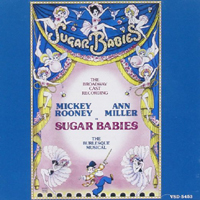 Original Broadway Cast, 1983 (B’way Entertainment/Varèse Sarabande)
Original Broadway Cast, 1983 (B’way Entertainment/Varèse Sarabande)  (2 / 5) Lavishly produced, beautifully designed, lovingly directed, Sugar Babies was a burlesque show featuring very funny old sketches performed by the unleashed Mickey Rooney, with Ann Miller as his partner and Jack Fletcher as his straight man. The production had a dog act, a candy butcher, a fan dancer — and you never knew what was going to come at you next. Unfortunately, this recording preserves very little of the show’s strongest suit: those hilarious low-comedy sketches, resurrected and dusted off by Ralph G. Allen. Instead, the album highlights the songs, and they’re a mostly lackluster bunch, even though nearly all of the music is by the great Jimmy McHugh. Some of the numbers have new lyrics by comedy writer Arthur Malvin; some are standards that McHugh wrote with Dorothy Fields, Ted Koehler, Harold Adamson, and others. They are well performed and orchestrated, but songs are not what we remember most about this show. — David Wolf
(2 / 5) Lavishly produced, beautifully designed, lovingly directed, Sugar Babies was a burlesque show featuring very funny old sketches performed by the unleashed Mickey Rooney, with Ann Miller as his partner and Jack Fletcher as his straight man. The production had a dog act, a candy butcher, a fan dancer — and you never knew what was going to come at you next. Unfortunately, this recording preserves very little of the show’s strongest suit: those hilarious low-comedy sketches, resurrected and dusted off by Ralph G. Allen. Instead, the album highlights the songs, and they’re a mostly lackluster bunch, even though nearly all of the music is by the great Jimmy McHugh. Some of the numbers have new lyrics by comedy writer Arthur Malvin; some are standards that McHugh wrote with Dorothy Fields, Ted Koehler, Harold Adamson, and others. They are well performed and orchestrated, but songs are not what we remember most about this show. — David Wolf
Sugar
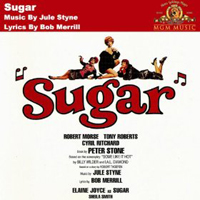 Original Broadway Cast, 1972 (United Artists/MGM)
Original Broadway Cast, 1972 (United Artists/MGM)  (2 / 5) Sugar was a shocker, the first indication that the great David Merrick production machine of the 1950s-’60s was breaking down. Gower Champion, one of the most dazzling director-choreographers of the period, reconstructed the show on the road pre-Broadway, replacing Johnny Desmond in the role of a singing gangster with hoofer Steve Condos, who was much more menacing because he said little and sang nothing but threateningly tap-danced everything. Merrick threw out the entire set and paid for a new one, but that wasn’t enough to make the show into a hit. Even the great, prolific composer Jule Styne was helpless when given lyrics as disgraceful as those provided him for this project by Bob Merrill. Perhaps the musical’s source material, the classic film comedy Some Like It Hot, simply resisted adaptation. Elaine Joyce had the impossible task of following Marilyn Monroe in what was easily her most appealing performance; Joyce comes across as cold and hard on the recording, though she wasn’t given any musical material that might have helped. Cyril Ritchard does nicely with his two numbers, which are among the better items in the score, but Tony Roberts (in the Tony Curtis part) has the dullest of the songs. This show was in Robert Morse’s pocket: As Daphne (the Jack Lemmon role), he kept Sugar running for over a year, giving an old-fashioned clown performance and making the most of every opportunity he was handed. Elliott Lawrence’s musical direction and Philip J. Lang’s orchestrations are so strong and confident that, as you listen, you may think the score is better than it is. [Ed. Note: Many years after its initial release, this album was reissued in a remastered CD version by Kritzerland, but it was a limited edition item and is no longer available.] — David Wolf
(2 / 5) Sugar was a shocker, the first indication that the great David Merrick production machine of the 1950s-’60s was breaking down. Gower Champion, one of the most dazzling director-choreographers of the period, reconstructed the show on the road pre-Broadway, replacing Johnny Desmond in the role of a singing gangster with hoofer Steve Condos, who was much more menacing because he said little and sang nothing but threateningly tap-danced everything. Merrick threw out the entire set and paid for a new one, but that wasn’t enough to make the show into a hit. Even the great, prolific composer Jule Styne was helpless when given lyrics as disgraceful as those provided him for this project by Bob Merrill. Perhaps the musical’s source material, the classic film comedy Some Like It Hot, simply resisted adaptation. Elaine Joyce had the impossible task of following Marilyn Monroe in what was easily her most appealing performance; Joyce comes across as cold and hard on the recording, though she wasn’t given any musical material that might have helped. Cyril Ritchard does nicely with his two numbers, which are among the better items in the score, but Tony Roberts (in the Tony Curtis part) has the dullest of the songs. This show was in Robert Morse’s pocket: As Daphne (the Jack Lemmon role), he kept Sugar running for over a year, giving an old-fashioned clown performance and making the most of every opportunity he was handed. Elliott Lawrence’s musical direction and Philip J. Lang’s orchestrations are so strong and confident that, as you listen, you may think the score is better than it is. [Ed. Note: Many years after its initial release, this album was reissued in a remastered CD version by Kritzerland, but it was a limited edition item and is no longer available.] — David Wolf
Subways Are for Sleeping
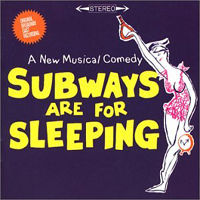 Original Broadway Cast, 1961 (Columbia/Fynsworth Alley)
Original Broadway Cast, 1961 (Columbia/Fynsworth Alley)  (4 / 5) A legendary title, if for no other reason than David Merrick’s scandalous marketing of the show: He looked in the phone book, found seven people with the same names as the major New York theater critics, and coaxed “rave reviews” from them, which he then had printed in a newspaper ad. This Jule Styne-Betty Comden-Adolph Green show was short-lived onstage, but it made for a cheerful, lively cast album that opens with a spectacular Styne overture, complete with subway effects and big, sassy orchestrations by Phil Lang. From there, it’s one urban delight after another. The score is heavy on comedy songs written with inimitable Comden-Green élan: Featured performer Phyllis Newman won a Tony Award largely on the basis of her hilarious “I Was a Shoo-ln.” Her vis-a-vis, Orson Bean, was nominated largely for his delivery of “I Just Can’t Wait (Till I See You With Clothes On).” You have to endure leading man Sydney Chaplin’s braying in “I’m Just Taking My Time,” but Chaplin nearly redeems himself in “Swing Your Projects,” a commentary on over-leveraged Gotham real estate that’s still topical. As Chaplin’s love interest, Carol Lawrence makes pretty noises in “Girls Like Me” and “I Said It and I’m Glad,” the latter a song with an arresting melody that was dropped during the run. Another appealing number is “Comes Once in a Lifetime.” The original LP album of Subways Are for Sleeping was packaged in a gatefold jacket, but reissues squeezed the notes onto one page. The CD edition offers intriguing bonuses: Comden and Green do a couple of cut songs; demo-album regulars Rose Marie Jun and Jack Haskell are heard from; and Comden’s pensive rendition of “Life’s Not That Simple,” a soulful casualty from Do Re Mi, is a joy. — Marc Miller
(4 / 5) A legendary title, if for no other reason than David Merrick’s scandalous marketing of the show: He looked in the phone book, found seven people with the same names as the major New York theater critics, and coaxed “rave reviews” from them, which he then had printed in a newspaper ad. This Jule Styne-Betty Comden-Adolph Green show was short-lived onstage, but it made for a cheerful, lively cast album that opens with a spectacular Styne overture, complete with subway effects and big, sassy orchestrations by Phil Lang. From there, it’s one urban delight after another. The score is heavy on comedy songs written with inimitable Comden-Green élan: Featured performer Phyllis Newman won a Tony Award largely on the basis of her hilarious “I Was a Shoo-ln.” Her vis-a-vis, Orson Bean, was nominated largely for his delivery of “I Just Can’t Wait (Till I See You With Clothes On).” You have to endure leading man Sydney Chaplin’s braying in “I’m Just Taking My Time,” but Chaplin nearly redeems himself in “Swing Your Projects,” a commentary on over-leveraged Gotham real estate that’s still topical. As Chaplin’s love interest, Carol Lawrence makes pretty noises in “Girls Like Me” and “I Said It and I’m Glad,” the latter a song with an arresting melody that was dropped during the run. Another appealing number is “Comes Once in a Lifetime.” The original LP album of Subways Are for Sleeping was packaged in a gatefold jacket, but reissues squeezed the notes onto one page. The CD edition offers intriguing bonuses: Comden and Green do a couple of cut songs; demo-album regulars Rose Marie Jun and Jack Haskell are heard from; and Comden’s pensive rendition of “Life’s Not That Simple,” a soulful casualty from Do Re Mi, is a joy. — Marc Miller
The Student Prince
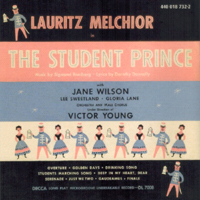 Studio Cast, 1950 (Decca)
Studio Cast, 1950 (Decca)  (3 / 5) Operetta albums from decades ago often sound even more dated than the material itself, with white-bread orchestrations and stilted singing. You’d expect the 1924 warhorse The Student Prince, with music by Sigmund Romberg and lyrics by Dorothy Donnelly, to come across badly in this recording; standards like “Serenade,” “Deep in My Heart, Dear,” and the “Drinking Song” can sound like parodies if mistreated. But the performance is quite good, thanks to Victor Young’s conducting and Lauritz Melchior’s singing. Although the heldentenor was thrice the age of an ideal Karl Franz at the time of the recording, he sounds like he could step right into a pair of lederhosen and play the hell out of the role. His top notes are thrilling, his enthusiasm infectious, and his thick accent great fun. (“The sweet May moon” comes out as “this wheat May moon”; “perfumed of roses and dew” sounds like “parv-youmed of roses and you.”) Jane Wilson’s American Kathie seems a little incongruous, but she’s warm and bright, despite some shrill trills. The original orchestrations are mostly intact, and Lee Sweetland and Gloria Lane offer able support. (Ed. Note: The CD edition of this recording also includes songs from The Merry Widow sung by Kitty Carlisle, Felix Knight, and Wilbur Evans. ) — Marc Miller
(3 / 5) Operetta albums from decades ago often sound even more dated than the material itself, with white-bread orchestrations and stilted singing. You’d expect the 1924 warhorse The Student Prince, with music by Sigmund Romberg and lyrics by Dorothy Donnelly, to come across badly in this recording; standards like “Serenade,” “Deep in My Heart, Dear,” and the “Drinking Song” can sound like parodies if mistreated. But the performance is quite good, thanks to Victor Young’s conducting and Lauritz Melchior’s singing. Although the heldentenor was thrice the age of an ideal Karl Franz at the time of the recording, he sounds like he could step right into a pair of lederhosen and play the hell out of the role. His top notes are thrilling, his enthusiasm infectious, and his thick accent great fun. (“The sweet May moon” comes out as “this wheat May moon”; “perfumed of roses and dew” sounds like “parv-youmed of roses and you.”) Jane Wilson’s American Kathie seems a little incongruous, but she’s warm and bright, despite some shrill trills. The original orchestrations are mostly intact, and Lee Sweetland and Gloria Lane offer able support. (Ed. Note: The CD edition of this recording also includes songs from The Merry Widow sung by Kitty Carlisle, Felix Knight, and Wilbur Evans. ) — Marc Miller
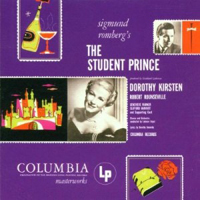 Studio Cast, 1952 (Columbia/DRG)
Studio Cast, 1952 (Columbia/DRG)  (3 / 5) Lehman Engel crams everything important from Sigmund Romberg’s landmark operetta into 52 minutes — quite a lengthy album for the time. The performance has a theatrical flair to it, right from the character-actor footmen in the opening number singing “By our bearing so sedate / We uphold the royal state.” The recording is well cast, with Robert Rounseville an enthusiastic Karl Franz (if a bit desperate on the top notes of “Serenade”)and Dorothy Kirsten a spirited Kathie. The choral singing is mushy at times, and some of the lyrics are unintelligible. An unbilled George Gaynes is easily recognizable in a prominent supporting role. — M.M.
(3 / 5) Lehman Engel crams everything important from Sigmund Romberg’s landmark operetta into 52 minutes — quite a lengthy album for the time. The performance has a theatrical flair to it, right from the character-actor footmen in the opening number singing “By our bearing so sedate / We uphold the royal state.” The recording is well cast, with Robert Rounseville an enthusiastic Karl Franz (if a bit desperate on the top notes of “Serenade”)and Dorothy Kirsten a spirited Kathie. The choral singing is mushy at times, and some of the lyrics are unintelligible. An unbilled George Gaynes is easily recognizable in a prominent supporting role. — M.M.
 Studio Cast, 1952 (RCA)
Studio Cast, 1952 (RCA)  (2 / 5) Oddly, when MGM made its 1954 film version of The Student Prince with Edmund Purdom lip-synching Mario Lanza’s vocals as he romanced Ann Blyth, no actual soundtrack album was released; instead, RCA offered this recording, which paired Lanza with Elizabeth Doubleday. The album includes three new songs by Nicholas Brodsky and Paul Francis Webster that were written for the movie. Lanza is in excellent voice here, but the sound quality of the mono recording is quite poor. This CD compilation also features Lanza et al. in excerpts from The Desert Song. — M.M.
(2 / 5) Oddly, when MGM made its 1954 film version of The Student Prince with Edmund Purdom lip-synching Mario Lanza’s vocals as he romanced Ann Blyth, no actual soundtrack album was released; instead, RCA offered this recording, which paired Lanza with Elizabeth Doubleday. The album includes three new songs by Nicholas Brodsky and Paul Francis Webster that were written for the movie. Lanza is in excellent voice here, but the sound quality of the mono recording is quite poor. This CD compilation also features Lanza et al. in excerpts from The Desert Song. — M.M.
 Studio Cast, 1960 (RCA/Sepia)
Studio Cast, 1960 (RCA/Sepia)  (3 / 5) A sort of stereo remake of the recording reviewed immediately above, this one has Mario Lanza joined by the coquettish Norma Giusti. The uncredited orchestrations are lush, and Paul Baron conducts with spirit. Lanza easily hits Karl Franz’s high notes, even with the keys pushed way up to show off his tenor. His singing is nicely understated in the Brodsky-Webster “Summertime in Heidelberg” and fervent in ”I’ll Walk With God.” Most of the original score’s songs are here, too, though wildly out of order and exclusively the property of Lanza and Giusti. Considering the absence of a supporting cast, this barely qualifies as a cast album, but the stereo sound quality is far superior to that of Lanza’s previous recording. — M.M.
(3 / 5) A sort of stereo remake of the recording reviewed immediately above, this one has Mario Lanza joined by the coquettish Norma Giusti. The uncredited orchestrations are lush, and Paul Baron conducts with spirit. Lanza easily hits Karl Franz’s high notes, even with the keys pushed way up to show off his tenor. His singing is nicely understated in the Brodsky-Webster “Summertime in Heidelberg” and fervent in ”I’ll Walk With God.” Most of the original score’s songs are here, too, though wildly out of order and exclusively the property of Lanza and Giusti. Considering the absence of a supporting cast, this barely qualifies as a cast album, but the stereo sound quality is far superior to that of Lanza’s previous recording. — M.M.
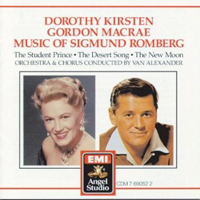 Studio Cast, 1962, Music of Sigmund Romberg (Capitol/Angel)
Studio Cast, 1962, Music of Sigmund Romberg (Capitol/Angel)  (2 / 5) Gordon MacRae’s unforced high baritone is always impressive, but he sounds bored and not very princely here. This recording also suffers from impersonal arrangements and bloodless conducting by Van Alexander. Dorothy Kirsten returns as Kathie, sounding much as she did 10 years earlier. Fully cast with no-name supporting players and capably backed by the Roger Wagner Chorale, the album zips through the score in 35 minutes but omits nothing major, reminding us how well Romberg spun standard-size scores into full-length operettas. With its safe tempi and American accents, this is sort of a summer-tent-theater rendering with a larger orchestra — agreeable enough, but more Harrisburg than Heidelberg. On Angel’s CD compilation, titled Music of Sigumund Romberg, the Student Prince tracks are accompanied by excerpts from The Desert Song and The New Moon. — M.M.
(2 / 5) Gordon MacRae’s unforced high baritone is always impressive, but he sounds bored and not very princely here. This recording also suffers from impersonal arrangements and bloodless conducting by Van Alexander. Dorothy Kirsten returns as Kathie, sounding much as she did 10 years earlier. Fully cast with no-name supporting players and capably backed by the Roger Wagner Chorale, the album zips through the score in 35 minutes but omits nothing major, reminding us how well Romberg spun standard-size scores into full-length operettas. With its safe tempi and American accents, this is sort of a summer-tent-theater rendering with a larger orchestra — agreeable enough, but more Harrisburg than Heidelberg. On Angel’s CD compilation, titled Music of Sigumund Romberg, the Student Prince tracks are accompanied by excerpts from The Desert Song and The New Moon. — M.M.
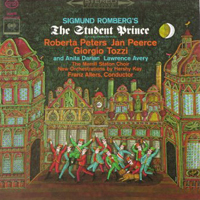 Studio Cast, 1962 (Columbia/no CD)
Studio Cast, 1962 (Columbia/no CD)  (1 / 5) Roberta Peters was a great lady of opera whose warmth and lack of pretension should have made her an ideal performer of operettas and musicals. Her entrance here, trilling in the “Drinking Song,” is lovely, and her voice is in wonderful shape; but afterward, there’s an excess of coyness that’s accentuated by the snatches of dialogue included on the recording. Jan Peerce as Karl Franz is a mature prince, but he has conviction, and Giorgi Tozzi is excellent as Dr. Engel. There’s just enough linking dialogue to propel the simple story. With a new set of orchestrations by the great Hershy Kay and musical direction by Franz Allers, this recording certainly seemed to have the potential to revitalize operetta, but Allers’ conducting is a trifle stiff, and Kay’s string-heavy charts don’t entirely escape that Muzak-operetta sound of the ’60s. — M.M.
(1 / 5) Roberta Peters was a great lady of opera whose warmth and lack of pretension should have made her an ideal performer of operettas and musicals. Her entrance here, trilling in the “Drinking Song,” is lovely, and her voice is in wonderful shape; but afterward, there’s an excess of coyness that’s accentuated by the snatches of dialogue included on the recording. Jan Peerce as Karl Franz is a mature prince, but he has conviction, and Giorgi Tozzi is excellent as Dr. Engel. There’s just enough linking dialogue to propel the simple story. With a new set of orchestrations by the great Hershy Kay and musical direction by Franz Allers, this recording certainly seemed to have the potential to revitalize operetta, but Allers’ conducting is a trifle stiff, and Kay’s string-heavy charts don’t entirely escape that Muzak-operetta sound of the ’60s. — M.M.
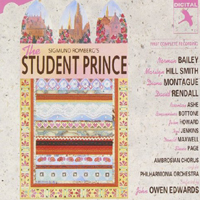 Studio Cast, 1990 (JAY, 2CDs)
Studio Cast, 1990 (JAY, 2CDs)  (4 / 5) Emil Gerstenberger was one of the outstanding Broadway orchestrators of the 1920s, equally adept at Romberg operetta and the jazzy musical comedies of the day. In the Romberg repertoire, his charts are lush and without that filmy coat of Muzak heard in many latter-day operetta recordings. For this first-ever complete recording of The Student Prince, the Philharmonia Orchestra and conductor John Owen Edwards recreated Gerstenberger’s work as closely as they could — and the result is a revelation. From the seven-minute overture to the bittersweet finale, the strings are full but not oppressive, the harp prominent but not obnoxious, and the brass thrillingly alive. It’s also a treat to hear a lot of incidental music not available elsewhere: an attractive waltz intermezzo, a couple of choral numbers, and some near-recitative linking passages. Edwards might have brought a little more urgency to the tempi, especially in the ballads, but his musical direction is otherwise expressive. As for the lead singers, Marilyn Hill Smith and Norman Bailey: If her Kathie seems to have arrived in Old Heidelberg by way of Mayfair, and if there’s a bit too much Dudley Do-Right in his attack, none of this compromises the material. David Rendall and Rosemary Ashe offer expert support, and a young Maria Friedman turns up as a “serving wench.” A single-disc highlights version is also available, but the double-CD set offers an authentic, 100-minute operetta experience. — M.M.
(4 / 5) Emil Gerstenberger was one of the outstanding Broadway orchestrators of the 1920s, equally adept at Romberg operetta and the jazzy musical comedies of the day. In the Romberg repertoire, his charts are lush and without that filmy coat of Muzak heard in many latter-day operetta recordings. For this first-ever complete recording of The Student Prince, the Philharmonia Orchestra and conductor John Owen Edwards recreated Gerstenberger’s work as closely as they could — and the result is a revelation. From the seven-minute overture to the bittersweet finale, the strings are full but not oppressive, the harp prominent but not obnoxious, and the brass thrillingly alive. It’s also a treat to hear a lot of incidental music not available elsewhere: an attractive waltz intermezzo, a couple of choral numbers, and some near-recitative linking passages. Edwards might have brought a little more urgency to the tempi, especially in the ballads, but his musical direction is otherwise expressive. As for the lead singers, Marilyn Hill Smith and Norman Bailey: If her Kathie seems to have arrived in Old Heidelberg by way of Mayfair, and if there’s a bit too much Dudley Do-Right in his attack, none of this compromises the material. David Rendall and Rosemary Ashe offer expert support, and a young Maria Friedman turns up as a “serving wench.” A single-disc highlights version is also available, but the double-CD set offers an authentic, 100-minute operetta experience. — M.M.
Strike Up the Band
 Studio Cast, 1991 (Elektra, 2CDs)
Studio Cast, 1991 (Elektra, 2CDs)  (5 / 5) The “Roxbury Recordings” series of restored Gershwin scores was a mixed bag, but this double CD of Strike Up the Band, recorded here in its unsuccessful 1927 version, is a joy. This was George and Ira Gershwin’s first attempt to actually say something in a musical. They created a plot-heavy but delightful score in perfect synch with the cynical book by George S. Kaufman and Morrie Ryskind. This painstaking reconstruction, with John Mauceri conducting orchestrations by eight different people (!), conveys the excitement of using musical comedy to score political points — a novelty in 1927. The recording is beautifully cast, with Brent Barrett and Rebecca Luker simultaneously sardonic and sincere in “The Man I love” and “Hoping That Someday You’d Care.” Jason Graae and Juliet Lambert are youthful ardor personified in “17 and 21” and “Military Dancing Drill,” while Beth Fowler is delicious in a Margaret Dumont-like role. Don Chastain plays a warmongering industrialist. There are two special bonuses here: a great, rediscovered Gershwin number, “Homeward Bound,” and Burton Lane’s gorgeous music for the verse for “Meadow Serenade” (the Gershwin melody couldn’t be tracked down). An appendix to the album adds six numbers from the rewritten (by Ryskind alone) 1930 version of the show, including the Gershwin perennials “Soon” and “I’ve Got a Crush on You.” The 1927 version may have shuttered in Philadelphia, but it’s a fascinating, acid satire on phony patriotism, unnecessary wars, and the corrupt military-industrial complex. Thank heaven we’ve outgrown such things! — Marc Miller
(5 / 5) The “Roxbury Recordings” series of restored Gershwin scores was a mixed bag, but this double CD of Strike Up the Band, recorded here in its unsuccessful 1927 version, is a joy. This was George and Ira Gershwin’s first attempt to actually say something in a musical. They created a plot-heavy but delightful score in perfect synch with the cynical book by George S. Kaufman and Morrie Ryskind. This painstaking reconstruction, with John Mauceri conducting orchestrations by eight different people (!), conveys the excitement of using musical comedy to score political points — a novelty in 1927. The recording is beautifully cast, with Brent Barrett and Rebecca Luker simultaneously sardonic and sincere in “The Man I love” and “Hoping That Someday You’d Care.” Jason Graae and Juliet Lambert are youthful ardor personified in “17 and 21” and “Military Dancing Drill,” while Beth Fowler is delicious in a Margaret Dumont-like role. Don Chastain plays a warmongering industrialist. There are two special bonuses here: a great, rediscovered Gershwin number, “Homeward Bound,” and Burton Lane’s gorgeous music for the verse for “Meadow Serenade” (the Gershwin melody couldn’t be tracked down). An appendix to the album adds six numbers from the rewritten (by Ryskind alone) 1930 version of the show, including the Gershwin perennials “Soon” and “I’ve Got a Crush on You.” The 1927 version may have shuttered in Philadelphia, but it’s a fascinating, acid satire on phony patriotism, unnecessary wars, and the corrupt military-industrial complex. Thank heaven we’ve outgrown such things! — Marc Miller
The Streets of New York
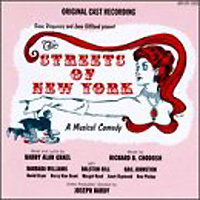 Original Off-Broadway Cast, 1964 (AEI)
Original Off-Broadway Cast, 1964 (AEI)  (5 / 5) For a long time, this was an extremely rare recording, so AEI’s CD release was especially welcome. With music by Richard Chodosh and lyrics by Barry Alan Grael, The Streets of New York is based on the famous old play of the same title by Dion Boucicault. Its melodramatic story should keep us at arm’s length from the characters, yet the songs are so compelling that the listener even comes to care about the so-called villains of the piece. The show begins with a through-sung prologue and then moves forward 20 years to 1890; each act concludes with an extended musical sequence utilizing reprises, leitmotifs, and some new melodies. The other 11 numbers represent some of the best musical theater writing of its day. Barbara Williams is deliciously evil if a tad shrill as Alida Bloodgood, giving outstanding performances of “He’ll Come to Me Crawling” and “Laugh After Laugh.” Hero and heroine David Cryer and Gail Johnston sing very well throughout, and particularly in the duet “Love Wins Again.” Ralston Hill is almost Shakespearean as principal villain Gideon Bloodgood, while co-author Grael is funny as the undependable yet finally heroic Badger, leading three Mexicans in the comedic “California.” A wonderful “Tourist Madrigal” reminds us that, in some respects, New York has changed very little over more than a century. Another highlight is the inventive “Where Can the Rich and Poor Be Friends?” It’s all quite delectable. — Jeffrey Dunn
(5 / 5) For a long time, this was an extremely rare recording, so AEI’s CD release was especially welcome. With music by Richard Chodosh and lyrics by Barry Alan Grael, The Streets of New York is based on the famous old play of the same title by Dion Boucicault. Its melodramatic story should keep us at arm’s length from the characters, yet the songs are so compelling that the listener even comes to care about the so-called villains of the piece. The show begins with a through-sung prologue and then moves forward 20 years to 1890; each act concludes with an extended musical sequence utilizing reprises, leitmotifs, and some new melodies. The other 11 numbers represent some of the best musical theater writing of its day. Barbara Williams is deliciously evil if a tad shrill as Alida Bloodgood, giving outstanding performances of “He’ll Come to Me Crawling” and “Laugh After Laugh.” Hero and heroine David Cryer and Gail Johnston sing very well throughout, and particularly in the duet “Love Wins Again.” Ralston Hill is almost Shakespearean as principal villain Gideon Bloodgood, while co-author Grael is funny as the undependable yet finally heroic Badger, leading three Mexicans in the comedic “California.” A wonderful “Tourist Madrigal” reminds us that, in some respects, New York has changed very little over more than a century. Another highlight is the inventive “Where Can the Rich and Poor Be Friends?” It’s all quite delectable. — Jeffrey Dunn

